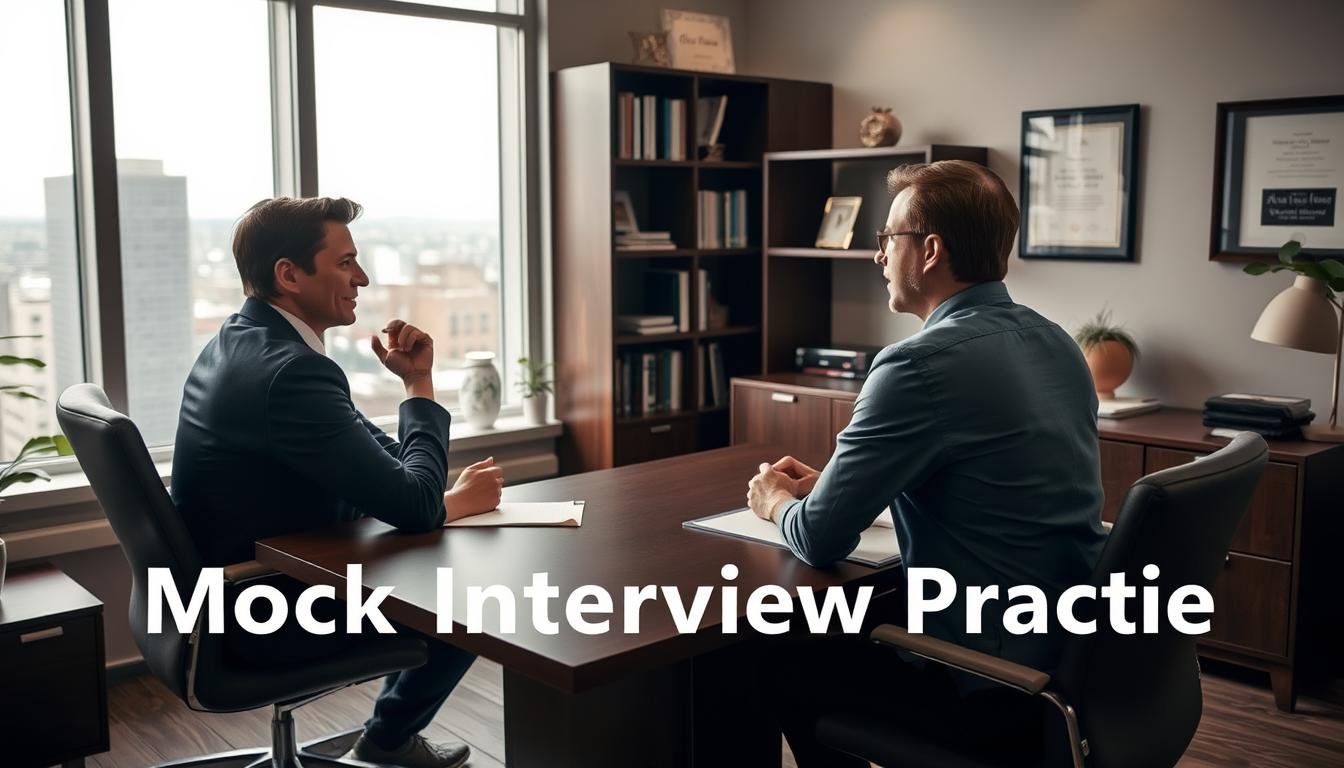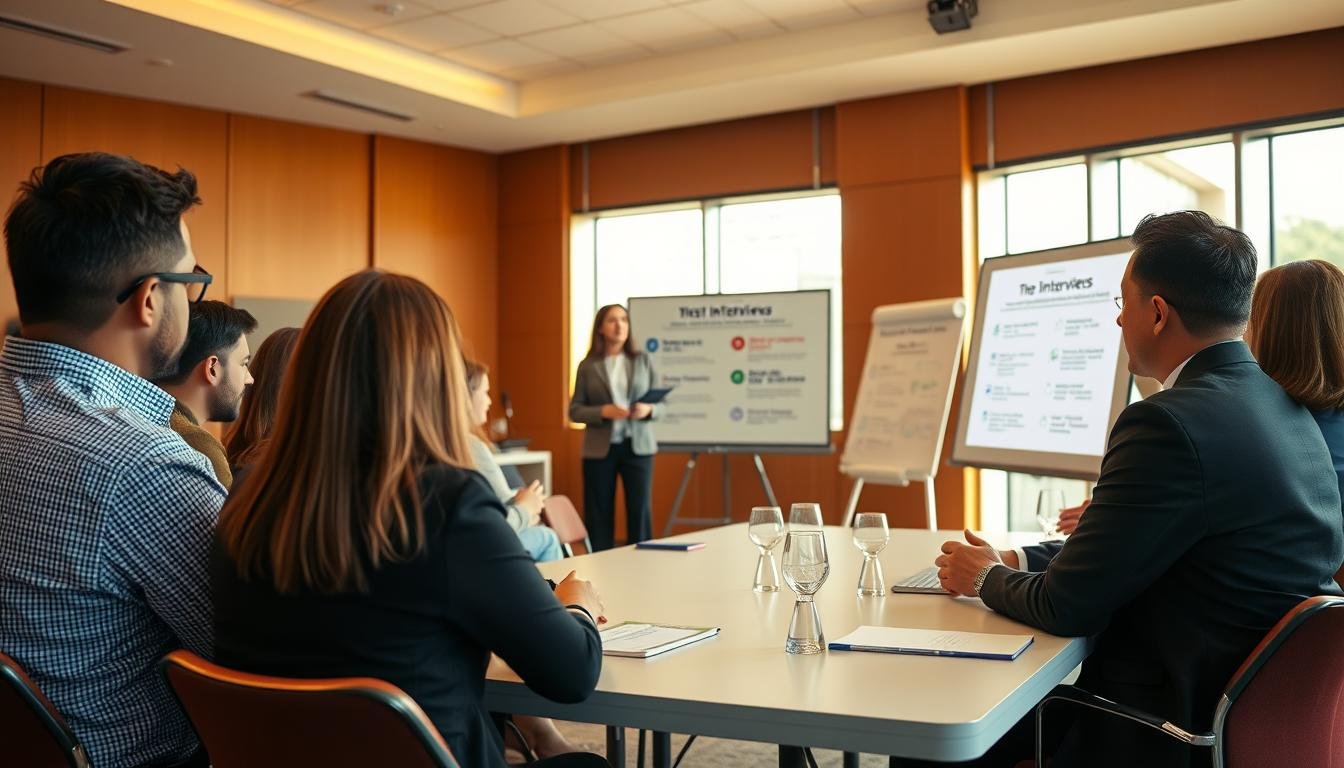Now Reading: 5 Mock Interview Questions You Must Prepare 4 Sample Answer
-
01
5 Mock Interview Questions You Must Prepare 4 Sample Answer
5 Mock Interview Questions You Must Prepare 4 Sample Answer

5 Mock Interview Questions You Must Prepare For (With Sample Answers)
A staggering 85% of job seekers fail to prepare well for their interviews. This leads to missed chances. Good job interview preparation is key to stand out in a tough job market.

Mock interview practice is a top way to prepare. It helps candidates fine-tune their answers to common questions. By practicing real interview scenarios, people can sharpen their interview skills training and feel more confident.
This article will cover five key mock interview questions. We’ll also provide sample answers to help you prepare.
Key Takeaways
- Understand the importance of mock interview practice in job interview preparation.
- Learn how to structure responses to common interview questions.
- Discover five critical mock interview questions to prepare for.
- Review sample answers to help guide your interview skills training.
- Improve your confidence and performance in real interviews.
Master the Art of Interview Preparation
Good preparation is key to a successful interview. It helps candidates show their strengths and stand out. Understanding what makes a good preparation plan is crucial.
The Critical Role of Mock Interviews
Mock interviews are very important. They let candidates practice their answers and improve their delivery. They also help identify areas for growth and boost confidence.
Some benefits of mock interviews include:
- Improved answers to common questions
- Better body language and non-verbal cues
- More confidence in sharing skills and experiences
How Strategic Preparation Builds Confidence
Confidence is essential for a great interview. Strategic preparation means knowing what to say and how to say it. Practicing and doing mock interviews helps build confidence.
Experts say, “Confidence comes from being prepared. Knowing you’ve done your homework boosts your confidence.”
“The way to get started is to quit talking and begin doing.”
Walt Disney
Setting the Foundation for Interview Success
A successful interview starts with good preparation. This includes researching the company, knowing the job, and practicing answers. Focusing on these areas helps make a strong impression.
To improve your preparation, think about joining professional development workshops. These workshops offer valuable insights and skills for the interview.
Question 1: “Tell Me About Yourself” – Crafting Your Professional Story
When you’re asked “Tell me about yourself,” it’s your chance to make a great first impression. This question is a common way to start an interview. It lets you share your professional story and set the mood for the rest of the conversation.
Why This Question Opens Most Interviews
The “Tell me about yourself” question is a key part of many interviews. It helps interviewers see how well you communicate and if you’re a good fit for the job. Good communication skills training can make your answer more confident and clear.
The Perfect 3-Part Structure for Your Response
A good answer has three parts: a brief introduction, a summary of your experience and skills, and your career goals. This structure makes your message clear and powerful.
Here’s how to structure your answer:
- Professional Introduction: Start with your current role or professional status.
- Relevant Experience and Skills: Highlight your key achievements and qualifications relevant to the job.
- Career Goals or Contribution: Mention your career aspirations or how you plan to contribute to the organization.
Sample Answer: Professional Introduction
Here’s an example of a well-crafted response: “As a seasoned marketing professional with over 8 years of experience, I have developed a strong background in digital marketing, including SEO and social media management. My most recent role at XYZ Corporation involved leading a team that increased our online engagement by 50%. I am now seeking to leverage my skills in a new challenge that aligns with my career goals and allows me to contribute to a forward-thinking organization.”
Why This Response Works
This response is effective because it clearly shows your professional background, a big achievement, and your career goals. It shows you’re well-prepared and a good fit for the job.
How to Tailor This Answer to Different Industries
To fit your answer to different industries, focus on the skills and experiences most relevant to the job and company. For example, in tech, you might talk about your technical skills. In finance, you could talk about your analytical skills.
| Industry | Key Skills to Highlight | Example |
|---|---|---|
| Tech | Programming languages, software development methodologies | “Proficient in Python and Java, with experience in Agile development.” |
| Finance | Financial analysis, budgeting, financial software | “Skilled in financial modeling and proficient in QuickBooks.” |
| Marketing | Digital marketing, SEO, social media management | “Experienced in managing social media campaigns and improving SEO rankings.” |
By tailoring your answer and focusing on the most relevant skills and experiences, you can show you’re a great fit for the role. This demonstrates your job interview preparation.
Question 2: “What Is Your Greatest Weakness?” – Turning Vulnerabilities Into Strengths
The question “What is your greatest weakness?” can be tough. It asks for a detailed answer that shows you know yourself well and are eager to grow.
Understanding the Psychology Behind This Question
Interviewers ask about weaknesses to see if you’re honest, self-aware, and can grow. It’s a chance to show you can think deeply and want to get better.
They want to know how you tackle challenges and if you’re proactive about getting better. Good mock interview practice helps you get ready for this.
The Growth Mindset Approach to Discussing Weaknesses
When talking about weaknesses, think of them as chances to grow, not as permanent flaws. This is called a growth mindset.
Focus on what you’re doing to get better. Show you’re serious about role-playing exercises to boost your skills and tackle weaknesses.
Sample Answer: Professional Development Focus
Here’s a good way to answer: “Being a perfectionist can make me spend too much time on one thing. I’m working on prioritizing better and setting realistic goals. This has made me more productive and able to handle more projects.”
Elements That Make This Response Effective
- Specificity: The candidate points out a clear area for improvement.
- Proactivity: The candidate shows they’re actively working on getting better.
- Positive Outcome: The candidate talks about the good results of their efforts.
Red Flags and Responses to Avoid
Avoid clichés like saying you’re a workaholic or work too hard. These sound fake and don’t show real self-awareness.
Don’t mention big flaws without talking about how you’re trying to fix them. Saying you can’t manage tasks without talking about how you’re improving is a red flag.
To do well in job interviews, use job interview tips to talk about your strengths and weaknesses clearly.
Question 3: “Why Should We Hire You?” – Selling Your Unique Value
Knowing what hiring managers want to hear can make a big difference. This question is key in the interview, letting you showcase your unique value and stand out. It’s a chance to show why you’re the best fit.
To give a great answer, understand what the hiring manager is looking for. They want to see if you have the right skills, experience, and fit for the company.
Decoding What Hiring Managers Really Want to Hear
Hiring managers want a clear, short story about your skills and experiences. They’re looking for specific examples that show how you can help the company succeed.
Aligning Your Skills With Company Needs
To answer “Why should we hire you?” well, you need to match your skills with the company’s needs. Do your homework on the company’s goals, challenges, and culture.
By knowing what the company needs, you can tailor your answer. Show how you can meet those needs and help the company grow.

Sample Answer: Value Proposition Statement
A good answer might be: “With my marketing background and success in boosting brand engagement, I can add a lot to your team. My skills in data analysis and campaign management match your goals. I’m eager to help your company succeed.”
Breaking Down This Successful Response
This answer is effective because it clearly lists the candidate’s relevant skills and shows how they fit the company’s needs. It also shows the candidate’s enthusiasm and confidence.
Customization Strategies for Different Positions
To tailor your answer for different jobs, research each job’s specific needs. Highlight different skills or experiences based on the job description.
By using these strategies, you can craft a compelling answer. It will highlight your unique value and improve your chances of getting hired.
How to Prepare for a Job Interview
Preparing for a job interview is crucial to make a good impression and showcase your skills. Here are some essential tips to help you prepare:
1. Research the Company
Before the interview, research the company thoroughly. Visit their website, read their mission statement, and understand their values and goals. This knowledge will help you tailor your responses to align with their expectations and showcase your fit for the role.
2. Review the Job Description
Study the job description carefully and make a list of the key qualifications and responsibilities. Think about how your skills and experiences align with the job requirements. This will help you provide specific examples during the interview that demonstrate your suitability for the position.
3. Prepare Your Responses
Anticipate common interview questions and prepare thoughtful responses. Practice answering behavioral questions that demonstrate your skills and experiences. Use the STAR method (Situation, Task, Action, Result) to structure your responses and provide clear examples.
4. Dress Professionally
First impressions matter, so dress professionally for the interview. Choose attire that reflects the company culture and industry standards. Pay attention to grooming and personal hygiene to present yourself in a polished and professional manner.
5. Plan Your Transportation
Ensure you have a reliable mode of transportation to the interview location. Plan your route in advance and allow for any unexpected delays. Arriving early shows punctuality and respect for the interviewer’s time.
6. Bring Copies of Your Resume
Bring multiple copies of your resume to the interview. This will allow you to provide the interviewer with an updated version if needed. It also demonstrates your preparedness and attention to detail.
7. Practice Your Body Language
Your body language speaks volumes about your confidence and professionalism. Practice maintaining eye contact, smiling, and using open and confident gestures. Avoid fidgeting or crossing your arms, as it can convey nervousness or disinterest.
8. Prepare Questions to Ask
Prepare a list of questions to ask the interviewer. This shows your interest in the company and the role. Ask questions about the company culture, future growth opportunities, and any challenges the team faces. This will also give you valuable insights into the company and help you determine if it’s a good fit for you.
9. Stay Calm and Confident
Take deep breaths and try to relax before the interview. Remember that it’s okay to be a little nervous. Use positive self-talk to boost your confidence and focus on showcasing your skills and experiences. Avoid apologetic language or downplaying your achievements.
10. Follow Up
After the interview, send a thank-you note or email to express your gratitude for the opportunity. This shows appreciation for the interviewer’s time and can leave a positive impression. Include a brief mention of your qualifications and how you believe you can contribute to the company’s success.
By following these tips, you can prepare effectively for a job interview and increase your chances of success. Remember to stay confident, showcase your skills, and demonstrate your enthusiasm for the role and the company.
Question 5: “Tell Me About a Challenge You Overcame” – Showcasing Problem-Solving Skills
Behavioral interview questions, like ‘Tell me about a challenge you overcame,’ need a smart approach. They aim to see how a candidate has handled past situations. This helps guess how they’ll do in the future.
Mastering the STAR Method for Behavioral Questions
The STAR method helps answer behavioral questions well. It stands for Situation, Task, Action, and Result. It lets candidates give clear, effective answers.
- Situation: Set the context for the story.
- Task: Describe the task or challenge faced.
- Action: Outline the actions taken to address the challenge.
- Result: Share the outcome of those actions.
Selecting Impactful Examples That Highlight Your Skills
Choosing the right examples for behavioral questions is key. Pick ones that show your skills and achievements. They should match the job you’re applying for and show your problem-solving skills.

Sample Answer: Professional Challenge Resolution
A candidate might say: “In my old job, we had a big challenge with tight deadlines and not enough resources. We had to finish the project on time without lowering quality. I worked with other teams to get more resources and made our workflow better. We finished the project two weeks early, and our team got praised for our teamwork and problem-solving.”
Key Components of This Effective Response
| Component | Description |
|---|---|
| Situation | Context about the project and the challenge faced. |
| Task | The specific challenge of meeting deadlines. |
| Action | Steps taken to reallocate resources and improve workflow. |
| Result | Outcome of the actions, including early completion and recognition. |
Common Storytelling Pitfalls to Avoid
Candidates should avoid being too vague or not showing a clear outcome. It’s also key to be brief and stay focused on the main challenge and solution.
By using the STAR method and picking the right examples, candidates can show their problem-solving skills. This helps in mock interview practice and real interviews, improving their communication skills training and overall performance.
Workshop Practicing Job Interviews: Structured Rehearsal Techniques
Preparing for a job interview means practicing with real mock interview scenarios. Create a setting that closely matches the actual interview. This helps you see how you do, find areas to get better, and polish your answers to common questions.
Designing Realistic Mock Interview Scenarios
Think about the job you want and the industry you’re in. Make the scenarios fit the job’s needs and the company’s goals.
Implementing Effective Role-Playing Exercises
Role-playing is great for practicing interviews. It lets you try out answers to common questions. You also get feedback to make your answers better.
Using Technology to Record and Analyze Your Performance
Technology can make your practice better. Use tools to record your mock interviews. Then, analyze your performance with video or audio recordings and automated tools.
Incorporating Professional Feedback Into Your Practice
Getting feedback from professionals is key. Ask for advice from peers, mentors, or experts. Also, use online resources like interview guides to learn more.
By using these methods, you can get better at interviews. You’ll feel more confident and do well in job interviews.
Elevate Your Interview Performance With Advanced Preparation Strategies
To improve your interview skills, you need a solid plan. This plan should include deep research and smart communication. It’s important to show you know the company and the job you’re applying for.
Conducting Thorough Company and Role Research
Knowing the company and the job is key to impressing interviewers. You should learn about the company’s mission, values, and products. Also, understand the job description and what skills are needed.
A Glassdoor survey found that 60% of employers like candidates who research the company. Visit the company’s website, read recent news, and use LinkedIn to find important info.
Mastering Non-Verbal Communication Cues
Body language and facial expressions are as important as what you say. Keep eye contact, smile, and show confidence with your body language. Richard Branson said, “Your clothes and how you present yourself show a lot about who you are.”
“The most important thing in communication is hearing what isn’t said.” – Peter Drucker
Developing Thoughtful Questions That Impress Interviewers
Asking smart questions shows you’re interested and prepared. Prepare questions that fit the company and the job. Ask about the company culture, team, and chances for growth. Here’s a table with some ideas:
| Category | Sample Questions |
|---|---|
| Company Culture | What are the company’s core values, and how do they impact daily operations? |
| Team Dynamics | Can you describe the team I would be working with, and what the dynamics are like? |
| Growth Opportunities | What opportunities are there for professional development and career growth within the company? |
By using these strategies, you can make a strong impression and boost your chances of getting the job.
Conclusion
Getting ready for a job interview is crucial. Practicing with mock interviews and knowing common questions can really help. This article has given you tips to prepare well and make a good impression.
With these strategies, you’ll be ready for tough questions. You’ll also show off your skills to employers. This will help you stand out in the job market.
Using the advice from this article, you can improve your interview skills. You’ll feel more confident and ready for your next job interview. This will help you succeed in your job search or career goals.
FAQ
What is the best way to prepare for a job interview?
To prepare for a job interview, research the company and role. Practice common interview questions. Also, do mock interviews to boost confidence and communication skills.
How can I improve my interview skills?
Improve your interview skills by practicing with role-playing. Get feedback from professionals. Also, work on non-verbal cues to make a good impression.
What are some common interview questions that I should prepare for?
Prepare for questions like “Tell me about yourself” and “What is your greatest weakness?” Also, be ready for “Why should we hire you?” and “Where do you see yourself in five years?” Don’t forget “Tell me about a challenge you overcame.”
How can I effectively answer the question “Tell me about yourself”?
To answer “Tell me about yourself,” use a 3-part structure. Highlight your experience, skills, and career goals. Tailor your story to fit the industry and company.
What is the STAR method, and how can it be used to answer behavioral questions?
The STAR method helps answer behavioral questions. Describe the Situation, Task, Action, and Result of your experience. It shows your problem-solving skills and value to employers.
How can I make a positive impression on interviewers?
Make a good impression by asking thoughtful questions. Master non-verbal cues. Show a growth mindset and enthusiasm for the company and role.
What is the importance of company research in interview preparation?
Company research is key in interview prep. It lets you understand the company’s needs and values. This shows you’re interested and motivated for the role.
How can mock interviews help in job interview preparation?
Mock interviews are great for practice. They let you try out answers to common questions. You can build confidence and get feedback to improve your skills.






























